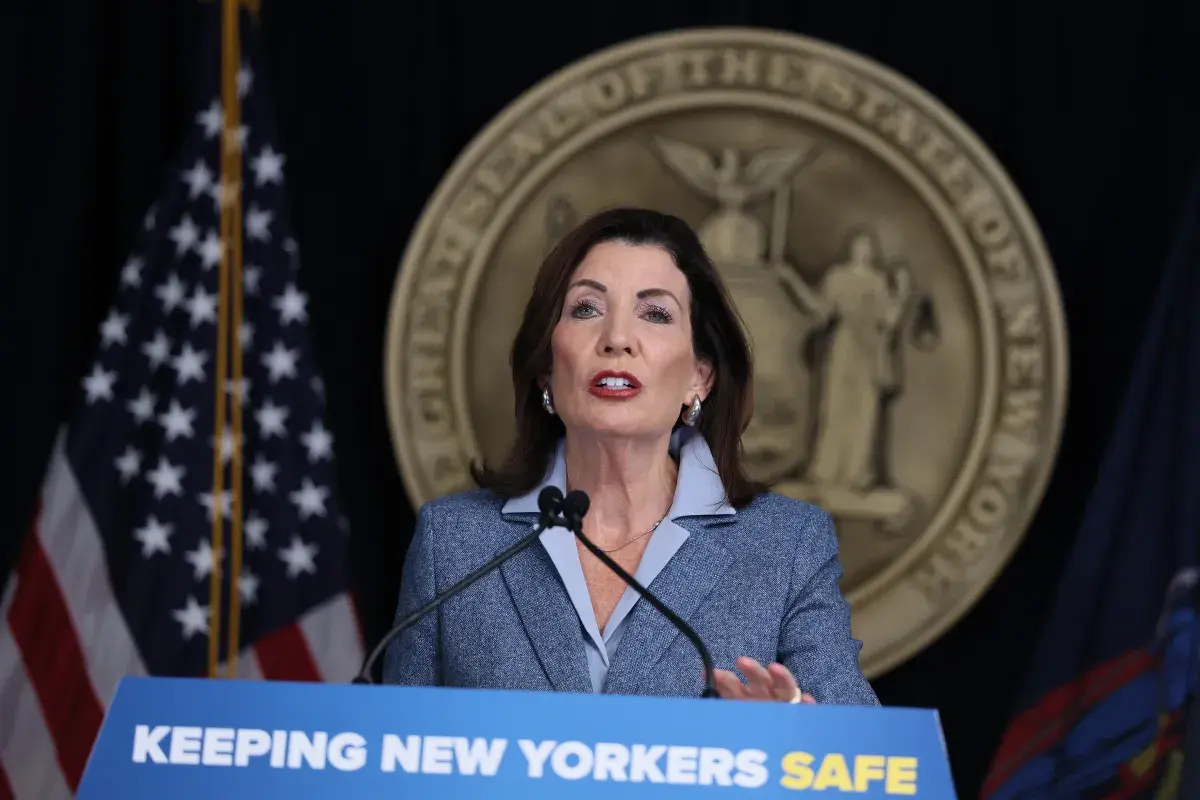Copyright Newsweek

Democratic New York Governor Kathy Hochul has slammed Republicans after health care premiums increased significantly for more than 100,000 New Yorkers. Around 140,000 in the state will experience heightened health care costs if the GOP continues to block the extension of existing enhanced premium tax credits. Why It Matters Hundreds of thousands of New York residents rely on Affordable Care Act (ACA) subsidies for more affordable health coverage. The ACA subsidies are the main source of contention between Republicans and Democrats in Congress—which are at a standstill over the current funding bill—triggering the larger government shutdown, and there's still no resolution in sight. What To Know New York residents will see their health insurance premiums increase by an average of 38 percent next year, according to Hochul’s office. That amounts to an average yearly increase of $1,400 for individuals and $3,000 for couples. “Republicans in Washington have made it clear – they don’t care about New Yorkers’ health care,” Hochul said in a statement. “It’s shameful. By refusing to extend the Affordable Care Act tax credits, they are turning their backs on their constituents and ripping away access to affordable, quality health care. Republicans in Congress need to do the right thing and extend these credits that make health insurance for New Yorkers more affordable.” In addition to urging congressional Republicans to extend the enhanced premium tax credits that help make insurance more affordable for New Yorkers, Hochul also called attention to the price hike per couple, based on their region in the state. For couples in Mohawk Valley, the monthly price jump could be as high as $270 on average, amounting to a 49 percent increase. “Currently, 140,000 New Yorkers who are tax credit eligible, benefit from the enhanced premium tax credits. These tax credits allow insurers to charge less in premiums, while still providing the same level of benefits. Without the tax credits, these New Yorkers will see a nearly 40 percent jump in their costs. More broadly speaking, all New Yorkers will feel the economic ripple effects of higher costs as more people opt out of coverage and hospitals and health care centers absorb additional uncompensated health care costs,” Danielle De Souza, senior public information officer for Hochul’s office, told Newsweek. “There is still time for Congress to act and NY State of Health stands ready to do everything in our power to ensure affordability for consumers. For 2026, a ‘clean extension’ of the enhanced premium tax credits – without changes—is the best path forward.” The subsidies introduced under ACA made health insurance more affordable and accessible to a larger number of Americans, and many have become reliant over the last 15 years on those subsidies, said Alex Beene, financial literacy instructor for the University of Tennessee at Martin. “The discontinuation of them that's scheduled to occur will present major increases to those same bills and while this fact was discussed during the process of the OBBBA [One Big Beautiful Bill Act] being passed, it's now getting renewed attention in the face of a government shutdown,” Beene said. “It could also be perhaps the catalyst for a deal being reached to reopen the government if more Republicans feel pressure to renew these credits.” What People Are Saying New York State Health Commissioner Dr. James McDonald, in a statement: “I thank Governor Hochul for standing up for New Yorkers who rely on the Affordable Care Act’s enhanced premium tax credits to keep their health care costs affordable. These are hardworking everyday people who deserve affordable health insurance. The start of the open enrollment period is fast approaching and without immediate action at the federal level, the threat of increased premiums is quickly becoming a reality. Allowing these enhanced premium tax credits to expire will be devastating for hardworking New Yorkers who will be forced to choose between paying for food, rent or paying for the health care they need to survive.” Kevin Thompson, CEO of 9i Capital Group and host of the 9innings podcast, told Newsweek: “The healthcare subsidies provide a cost offset for those who meet the qualifications. If those very subsidies go away, it’s not the fact that prices will move higher, it’s the change in the subsidy that forces higher payments for the beneficiary.” Michael Ryan, finance expert and founder of MichaelRyanMoney.com, told Newsweek: “The real question isn't whether Congress extends the credits. It's what income caps and means-testing they'll attach when they do. Centrists are already floating $200k income limits & minimum premium contributions. That's what I expect is the compromise framework taking shape behind closed doors. “For anyone retiring before 65, this is the healthcare cost wildcard that just became the entire deck. The subsidy cliff was always coming. We just didn't know if Congress would push it back or let people fall.” What Happens Next Open enrollment begins November 1, but the government shutdown is set to impact Americans relying on several other federal programs as well. “This standstill will impact the millions of Americans in the SNAP programs, millions of Americans receiving government paychecks, and will start impacting travel if not handled promptly,” Thompson said. “Congressional members will likely extend the tax credits, as for the enhanced version, only time will tell. It is no secret that Republicans have been wanting to rollback Biden era programs, and this was at the forefront.”



